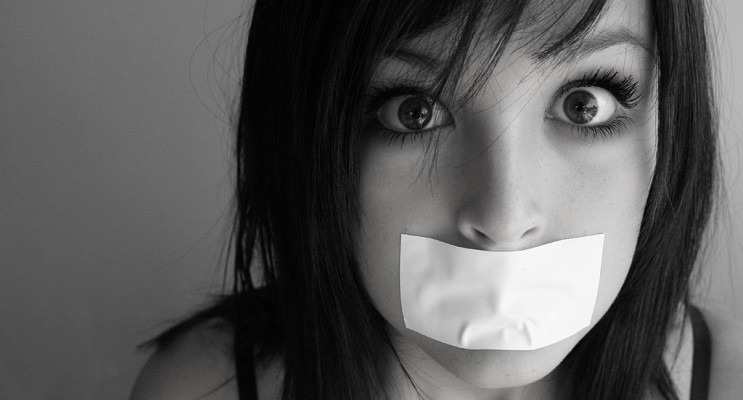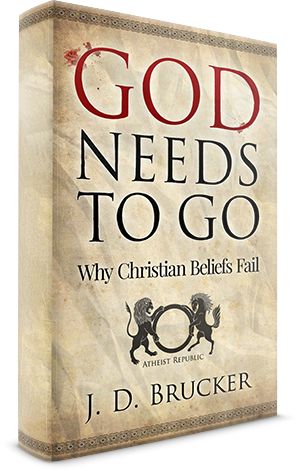
The Facts
We often hear stories in the news about religious or racial discrimination. When we learn about tolerance as children, we are told that everyone is equal and should be treated with equal respect no matter their religious affiliation, colour of their skin or if they are differently abled. Many atheists believe that “no religion” should be the default, which would mean people really shouldn’t have to be told not to discriminate on the basis of someone’s LACK of faith. But because atheists are the minority in our world today, discrimination against them is more rampant than the religious would have us believe.
What is Discrimination?
Disrimination (from Wikipedia): Moral philosophers have defined discrimination as disadvantageous treatment or consideration. This is a comparative definition. An individual need not be actually harmed in order to be discriminated against. He or she just needs to be treated worse than others for some arbitrary reason.
Practically speaking, there are two types of discrimination against atheists: overt discrimination is primarily the type that criminalises atheism or directly punishes someone for being an atheist or speaking out against the dominant or established religion. This can happen on a large scale through laws or on a smaller scale through company policies or unspoken but understood expectations.
Covert discrimination is typically leveled on a smaller scale, in personal interactions but in a way, it is more detrimental because it’s so pervasive. This kind of discrimination, left unchecked, can become overt. Many atheists, at one point or another, experience a sense that many people think they aren’t as moral or trustworthy as a religious person but they can’t prove that these feelings have had a measurable impact on things like jobs or education.
Overt Discrimination: In the News by the Numbers
It’s difficult for many of us in North America to believe that overt discrimination against atheists exists on a scale large enough to take notice. However, in spite of a new global study that reports the religiously unaffiliated number 1.1 billion, accounting for about one-in-six (16%) people worldwide, atheists continue to face persecution globally.1
The International Humanist and Ethics Union (IHEU) reported to the United Nations this month (February, 2013) that atheists, humanists, freethinkers and other non-religious people are discriminated against around the world. Expression of their views is often criminalized and subject in some countries to capital punishment.2
In Afghanistan, Iran, Maldives, Mauritania, Pakistan, Saudi Arabia, and Sudan atheists can face the death penalty on the grounds of their beliefs. There are laws outlawing apostasy and religious conversion in Bahrain, Comoros, Maldives, Mauritania, Saudi Arabia, and Sudan.
Compulsory religious registration in conjunction with a list of religions permitted by government, such as in Indonesia and Jordan, is also discriminatory. In Iran, citizens have to declare their faith in one of the four officially recognized religions in order to be able to claim a number of legal rights. In Burma, Djibouti, and Maldives, certain forms of political participation (such as holding office or voting) depend upon citizens officially registering themselves as having certain religious affiliations.
Acting Against the Dictates of Religion
A more common form of discrimination occurs against secular people when they manifest their conscience by acting against the dictates of the religion of their family, community or country. In Greece and Russia, the Orthodox Church is fiercely protected from criticism and is given pride of place on state occasions, while in Britain bishops of the Church of England have automatic seats in the upper house of parliament. In at least seven U.S. states, constitutional provisions are in place that bar atheists from public office and one state, Arkansas, has a law that bars an atheist from testifying as a witness at a trial.3
Social networks like Facebook, Twitter and other online communities are increasingly targeted. People from Bangladesh, Bahrain, Egypt, Indonesia, Kuwait, Saudi Arabia, Tunisia, and Turkey have been prosecuted for “blasphemy” as a result of comments made on social networks.
In an attempt to protect religion, it is often the non-religious who become new victims. Atheists often face discrimination as part of anti-defamation laws. This is especially seen in countries that attempt to ban “hate speech” against Islam.
As stated in the report, “Just as freedom of religion or belief protects the right of the individual to follow a religion, it also protects the right to reject any religion or belief, to identify as humanist or non-religious, and to manifest non-religious convictions through expression, teaching and practice. Whilst this fundamental right includes the right not to reveal your beliefs or religious identification, and the right not to take part in religious ceremonies, it also includes the freedom to argue for those beliefs in public, and to seek to persuade others of the merits of your beliefs, or the flaws of theirs, through debate and criticism.”
Why Should Religious People Care and what can we do About it?
An interesting component to the discussion about atheists and discrimination is related to how we classify atheism. First, there is disagreement even amongst atheists about whether or not varieties of atheism should be classified as religions. For example, according to some people, atheism could be categorized as an overarching classification/religion similar to Christianity while humanism could be classified as a denomination of sorts. In this way, atheism could be afforded the same protections as other religious beliefs under the umbrella of religious protection.
But that runs contrary to much of the message many atheists are trying to send – namely that a lack of belief is not a belief. It’s true that atheists “believe in stuff”, but is belief the same as a religion. Is the belief in human goodness and making the world a better place a religion?
I could be way off philosophically but I tend to look at it this way: Atheism is brought into the discussion of religious liberty because in a way, atheism is the other side of the religion coin. If one side is religious belief, the other side is no religious belief. In that way, one cannot protect one side of the coin without protecting the other.
Discrimination Against One, Discrimination Against All
If human societies desire to afford protection to people on the basis of their religious convictions, speaking against that religion (without committing rights violations) and living in a way that is not necessarily consistent with that religion must also be protected. And in the case of a certain government refusing to extend those protections to the non-religious, there is absolutely cause for outrage.
In practical, day to day living, atheists and theists need to determine amongst themselves, what is going to work for them. This will look different in each case. Atheists will need to take notice and speak up for school kids subjected to prayers or religious literature, neighbours bad-mouthed on the basis of their atheism, local politicians harassed because they don’t believe in a god, etc.
On a larger scale, it’s pretty clear that discrimination against atheists is real. It’s happening on a scale large enough for the global community to take action. The first step to making a difference is acknowledging that this is happening and bringing it to the attention of those who think otherwise. Discrimination against atheists is happening at the hands of every major religion around the world and it’s just as detrimental as persecution against Christians or Muslims.
What can I do to Stop Atheist Discrimination?
- Give your money: Make donations to local and international atheist organizations and human rights organizations that recognize human rights violations against atheists as a real thing.
- Sign your name: Most atheist organizations with mailing lists will alert you to petitions. The International Humanist and Ethical Union is a good start.
- Speak up: Call, email or write an old fashioned letter to your elected officials, to demand that they treat human rights violations against atheists as seriously as they do any other kind.
- Get digital: Consider following theist organizations and taking note of the things they say, the positions they support, etc. then draw attention to those that violate human rights, esp. those of atheists.
- Don’t put up with it: contrary to what some people accuse, atheists (especially younger atheists) are extremely tolerant. They put up with quite a lot and are used to being stereotyped. They are also used to enduring the religious convictions of most people around them. I for one think this is a great thing. But it’s also time for atheists to start speaking up for themselves and taking discrimination to task when it’s leveled against them. Stand up for yourself, your friends and family and your neighbours – legally when needed.
Atheists are discriminated against in overt and covert ways around the globe, every day. It matters for all of us and it’s time to take action.
1 Reported in Freedom of Thought 2012, released by the International Humanist and Ethical Union (IHEU)
2 IHEU 2013 report to the United Nations
3 Reuters. Atheists around the world suffer persecution, discrimination: report






























